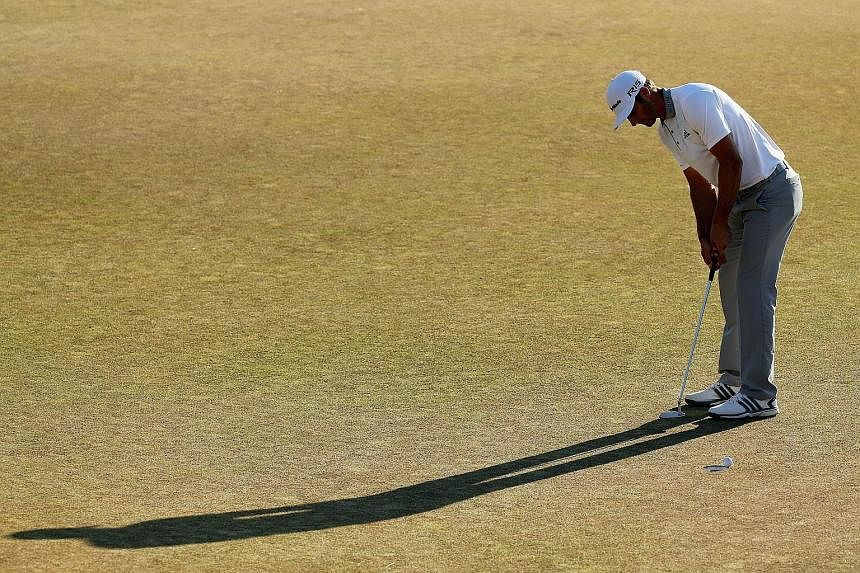AT THE end they looked grim, men playing not a golf course but an assault course. Trying to survive first, then win. Conquering not this mad, undulating earth but themselves. Branden Grace looked to the sky. Jordan Spieth spoke in disbelief to his caddie. Louis Oosthuizen birdied a hole and refused to smile. Making history is scary.
Dustin Johnson, who writes epic versions of golfing Greek tragedies, simply showed nothing, as if a mask had dropped when his four-foot putt to force a play-off would not. Later he held his son tightly and left the course and if only the paper-hearted felt no sympathy, then too much symbolism was also wrenched from this image. In truth, he lives every day for his son, yet on this day he lived for a cup and he lost it.
It was a cruel, taunting and yet terrific day, for there is no joy in seeing a man's spirit brutalised and yet a pleasure found as athletes are jostled by pressure. You could feel the tautness of tension as men tried to be inch-perfect while listening to a drum solo that was their heartbeat.
-
Dustin's agony
- 2010 US Open
-
Dustin Johnson held a three-stroke lead entering final round, shot an 82.
2010 PGA Championship
In the lead at the final hole, but was assessed a two-stroke penalty for grounding his club in a bunker. Missed play-off.
2011 British Open
Trailed by two strokes entering 14th tee in final round, double-bogeyed the hole and finished joint-second.
2015 US Open
Three-putted final hole, missing chance to enter a play-off with eventual winner Jordan Spieth.
As the holes wound down, the great shot was pursued yet the mistake was inevitable. Almost everyone was going to make one. Because this is sport, and you're human, and you're aching for victory, and your palms are clammy, which is nothing to be ashamed of because Lionel Messi vomits.
But when would the mistake come? Who could recover from it? Who had the time to?
Grace's mistake came at the 16th, a solid, straight man now slicing a drive out of bounds. He, then co-leader, looked to the sky as if it had fallen without warning on him. Headline writers everywhere sighed: Grace Under Pressure they already had prepared. But he would not recover.
Spieth's mistake arrived at the par-three 17th, an iron into the rough, a short putt missed, a three-shot lead disappeared. Yet he pursues perfection with such zeal it has left him prematurely bald and he responded with a 284-yard shot to eagle distance on the 18th and made birdie.
But whether Spieth's mistake on the 17th would cost him would depend on whether Johnson made one himself. In the heartless equation of sport, one man's joy required another man's misfortune.
Johnson is a puzzling man whose nerves may be the most examined bundle of fibres since Ivan Lendl was put under a microscope. The tennis star lost his first four Grand Slam finals; Johnson after Sunday has had a chance to win four Majors. He's been the Almost One which must be no fun when your ice-hockey legend of a future father-in-law, Wayne Gretzky, is still known as The Great One.
Nevertheless, Johnson got a second chance because Spieth's error gave him one. He birdied the 17th and then stroked a soaring five-iron from 247 yards on the 18th to 12 feet, four inches.
Eagle putt to win a first Major.
He missed.
Birdie putt for a play-off.
He missed.
One minute he's putting to be redeemed, next moment he's putting not to be a punchline. His mistakes were large, his mistakes were ill-timed. He had run out of holes and therefore hope.
No one died, as Boris Becker once reminded us of defeat, yet what sport can sometimes do to athletes can be unspeakable.
No athlete will mock Johnson for no one is immune to the choke. Especially the hitter of penalties, putts and second serves, for they give athletes what they don't always want: Time to think too much.
The snooker magician Jimmy White was up 14-8 in the 1992 world championship final when, as he told the Guardian, he forgot the present and travelled into the future: "I started getting carried away, thinking about what I'd do once I won, what I'd say... That was fatal." He lost 14-18.
Maybe Johnson's mind didn't visit the future but journeyed to the mistakes of his past before he putted. Maybe he'll find a way to rationalise it, as athletes often do after despairing defeat. Three months after her 1993 Wimbledon final collapse when leading Steffi Graf 6-7, 6-1, 4-1, Jana Novotna defiantly told the Independent: "All I was doing was going for my shots. That's the way I play."
Novotna won Wimbledon eventually. Lendl, once hailed as a citizen of CHOKE-oslovakia, won eight Grand Slam titles. Athletes fall and rise, lose and learn, and it is their jobs and yet also an irresistible bravery.
Some - like White - never win the greatest prizes but it is the trying that defines them. Gretzky once said, "You miss 100 per cent of the shots you don't take", and Johnson has to wear that philosophy. He has to keep putting himself in contention, has to keep creating putts to win. One day, he will believe, one will go in. Make no mistake about that.


